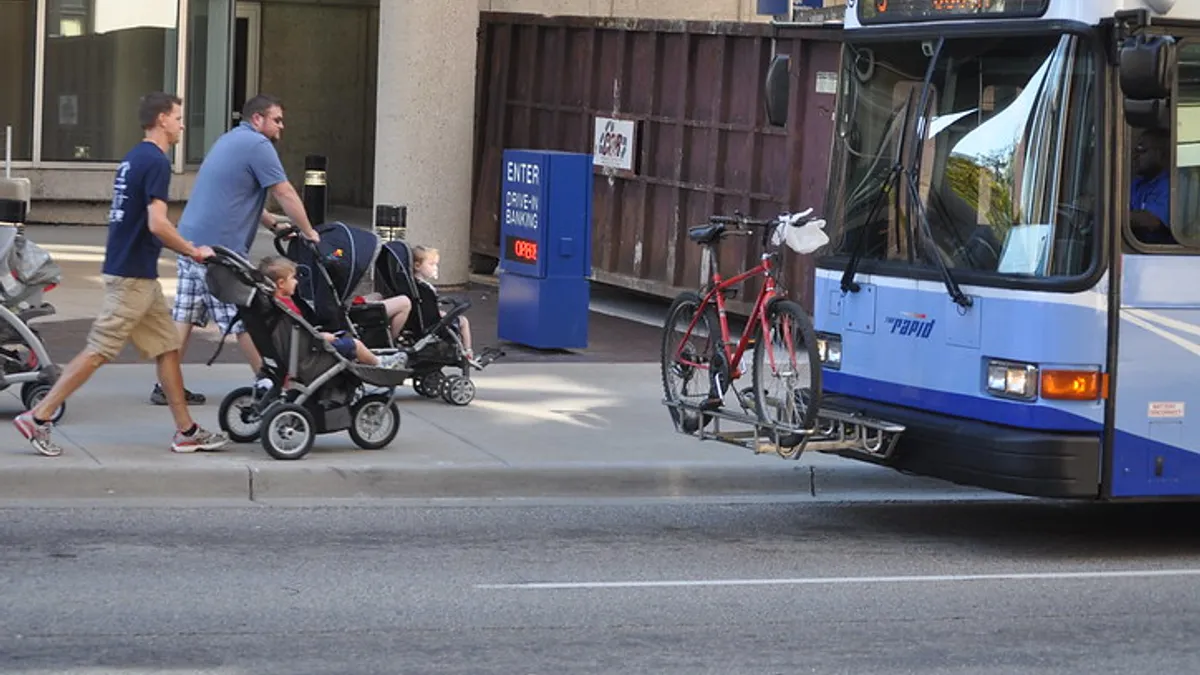Dive Brief:
- The New Urban Mobility alliance (NUMO) and a signing coalition of mobility-related operators and providers have penned a letter to Congress with recommendations for leaders to consider in ensuring the Investing in a New Vision for the Environment and Surface Transportation (INVEST) in America Act prioritizes safe and affordable access to public transit and shared micromobility options.
- Recommendations include: developing new federal transportation performance measures; providing adequate capital and funding support for public transit; funding resilient infrastructure and roadway design; providing targeted support for integrated multimodal transportation systems; and deploying funding to support vulnerable populations' transportation needs.
- The signing coalition includes Lime, Lyft, the North American Bikeshare Association, Spin, Transit app, TransitScreen, Transportation for America, Uber and Via.
Dive Insight:
The $494 billion INVEST in America Act, introduced in early June by Democrats on the House Transportation and Infrastructure Committee, looks to restore the nation's transportation infrastructure and enhance street safety, among other priorities outlined. Under the proposed bill, $411 billion would be pulled from the Highway Trust Fund for improvements to highways and transit, while $60 billion would be dedicated to rail improvements and $250 million would be granted to Complete Streets programs.
The bill also includes a first-of-its-kind performance measure that requires transportation agencies and project sponsors to increase access to services, which will mark "a huge shift in how transportation funding will be allocated," Transportation for America wrote in a post regarding the bill.
In an interview with Smart Cities Dive, NUMO Director Harriet Tregoning lauded most of the INVEST Act, but said more must be done to increase safe transportation access for all Americans.
She pointed to the $2 trillion Coronavirus Aid, Relief and Economic Security (CARES) Act, which dedicated $25 billion to transportation systems when it was passed by Congress in March. While the money was enough to keep most transit operations running, "it also really pointed out how enormously important transit really is. For many people, it’s their only way of getting to work," Tregoning said.
"For more than 50 years, we’ve really made the car king in all of our decisions and pretty much ignored the people who don’t have access by automobile," she continued. "And especially after the financial ramifications [of the coronavirus pandemic] really begin to roll out across the country, many fewer households will have access to cars."
That access to cars will most likely impact marginalized communities, she said. There are five times as many Black car-less households as White car-less households in the U.S., according to Tregoning, which has a direct impact on a Black person's access to jobs and healthcare.
"There’s nothing more structural in terms of inequity in our country than our transportation system," she said.
Such inequity issues also apply to seniors and persons with disabilities. The federal government has more than 13 agencies with 130 different transportation programs to serve low-income, elderly or disabled communities, yet they each have various requirements to receive aid. NUMO is encouraging Congress to "simplify and harmonize eligibility and use requirements" to increase access to those programs rather than creating more programs.
And while Tregoning is pleased with Congress' move to include a mandatory access performance measure for transportation projects and improvements, she said that access needs to be encouraged more widely and urgently to address structural disparities and inequalities.
"There’s no better chance anywhere in government than with this transportation reauthorization bill to really knock down those structures that make things so unequal," she said. "And it would just be a tragedy if we missed the opportunity to do that."













